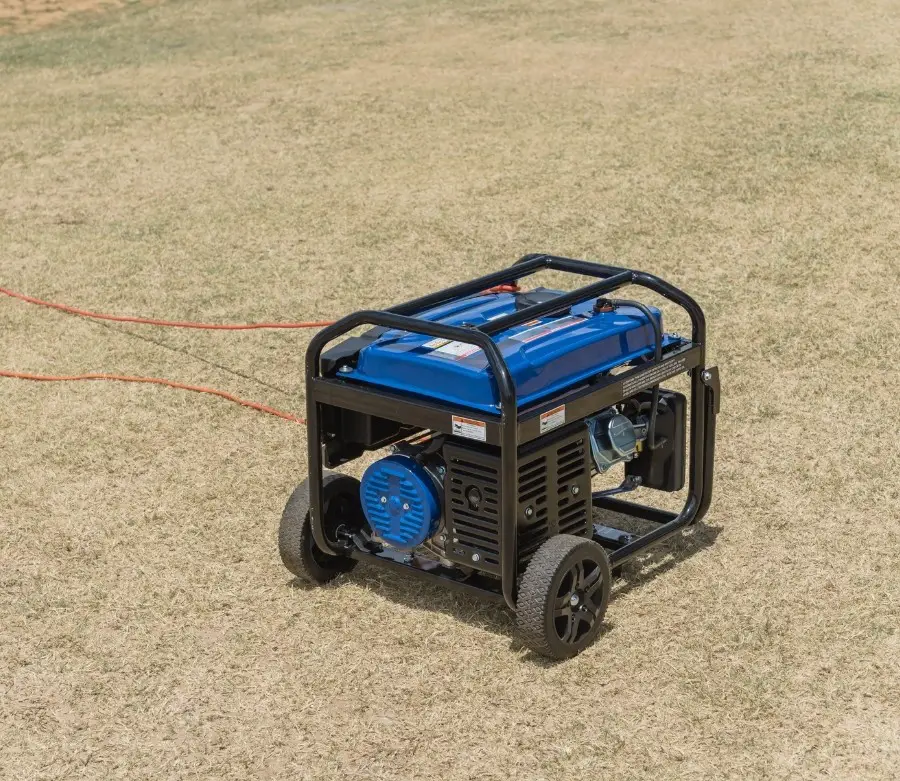
Portable generators can be of utmost importance, especially if you live in an area prone to natural disasters and frequent power outages, but they can be distracting.
The vibration the generator makes can send blaring buzzes for all of your neighbors to hear, but there are many tools to reduce the noise and make your portable generator quieter.
How can you make a portable generator quieter? To reduce generator noise, try the following:
- Invest in a high-quality model.
- Give your current generator a tuneup.
- Use extension cords to increase the distance from your home.
- Purchase a muffler or silencer.
- Reposition exhaust or exhaust into water.
- Build a generator noise box.
How do I get a noise box? Where is the best place to put my portable generator? What are some of the best mufflers on the market?
These burning questions are all good ones. In the following, we’ll provide the answers you’re looking for.
Generator Location and Positioning
The easiest way to reduce noise from your portable generator is to keep it as far away as possible where it is still able to be effective.
If your generator is near bedrooms and living areas, the sound of the engine and exhaust will be nearly unbearable. Keep your generator somewhere away from house entrances and windows.
The exhaust is often the primary part of the generator that is making so much noise.
To reduce sound, try adjusting the positioning of the exhaust and make sure nothing is blocking it, as this can produce even more irritating noises.
Mufflers and Silencers
Mufflers and silencers are known to be the most effective way to reduce noise on a portable generator.
Luckily, they don’t have to be expensive to work well, but investing in a higher quality muffler may be worth it if that noise is just too much to bear.
Mufflers
Chances are, you probably already have a muffler on your portable generator as they are an attachment of the exhaust.
However, if your generator’s noise level is distracting or you have noticed it is getting louder the more you use it, it may be time to replace your muffler.
Here are some mufflers we found that will do the trick in all price ranges!
Silencers
The only true difference between a silencer and muffler is that a muffler is a part of the exhaust and a silencer simply attaches to it.
They do essentially the same thing, so deciding between a silencer and a muffler is really up to your preference and what product works best for your portable generator.
Accessories for a Quieter Generator
Maybe you already have a muffler on your generator, but your crazy neighbor Dave is still complaining about the noise level.
Here are a few other accessories you can use to give your ears, and Dave’s, a break.
Extension Cords
With something as simple as an extension cord, you will be able to give yourself more options as to where you put your generator.
If the generator cord is not very long, it is going to be right next to your house, which is not optimal. With an extension cord, you can move it across your backyard, or at least father than you could otherwise.
Generator Box
A generator box is one of the most useful accessories for a quieter generator. It will trap in the noise of the engine, and when paired with a muffler you will barely be able to hear it.
You can buy a generator box or make one at home. In this article, we give you step-by-step instructions and show you just how easy it is!
Sound Deflectors
While they are not as effective as a generator box, sound deflectors will reduce noise in whatever location you are targeting.
Using rubber vinyl as you would in a music studio deflects noise away from you pretty well, and you can typically buy sound deflectors, like this set of 6, for a much cheaper price than a sound box.
DIY Sound Box and Other Solutions
The cheapest way to make your portable generator quieter is often to just build the accessories yourself!
There are not very many sound boxes on the market, and the boxes that are available to buy are expensive. Here is how you can make a generator sound box at home in just a week.
DIY Sound Box
To build your very own sound box right from home, here are some things you will need:
- Plywood.
- Soundproof foam.
- Bungee cords or cables.
- Hinges.
- Cement bricks.
- Cement mix and water.
Make sure to wear safety gear before you start – including gloves and a high-quality mask or shield.
- Choose where you want the generator to go, and measure the dimensions by length and width to start the framework for the enclosure. Measure the size of your generator.
- Cut the wood a few inches larger than the generator itself to leave room for the bricks. Position the plywood wherever you would like your box to be.
- To ensure the wood will stay in place, take hooks you can hammer into the ground, and secure your framework with hinges all around the plywood.
- Mix your cement and pour it into the wooden enclosure up to the top. Using an extra piece of plywood, drag it over the top to level the cement flat. The cement needs to be level, as this will make your generator quieter.
- Wait for the cement to dry for about five days to a week.
- Using wet cement to stick them together, begin to build your cement bricks into a box shape on top of the cement slab. Make sure you are laying them so that the thinner sides of the brick are facing up and down.
- Once the cement has dries and the bricks are secure, use industrial glue to attach the soundproof foam to the inside of the enclosure on each side.
- Make a door for the top by measuring out the length of the top, and horizontally lay out plywood to match the top size. Screw the pieces together and add two more pieces of plywood on the bottom vertically to strengthen it.
- Attach the door to the generator box with hinges.
- Finally, put your generator into the box and say goodbye to loud noise!
Water Solution
Water is an optimal way to reduce noise in any situation. For a cheap and much easier solution to make a generator quieter, you can attach a pipe to the exhaust and put the other end in a bucket of water.
If the water starts to bubble, you are all set! This is the cheapest and easiest solution for reducing the noise.
To Summarize
Making a generator quieter is truly a simple fix. Purchasing a silencer or muffler is the perfect balance between affordability and effectiveness.
If you are the kind of person that loves to take on projects, a DIY generator box or sound box is a perfect solution.
No matter what the budget range is, anybody can make their portable generator quieter.
Sources:
https://www.instructables.com/Enclosure-for-a-Generator/
https://voltagehero.com/why-are-the-portable-generators-usually-so-loud/
https://soundproofadvice.com/soundproof-generator-box/
https://generatorgrid.com/blog/muffler-silencer/
https://www.trustedhints.com/portable-generator-accessories/
